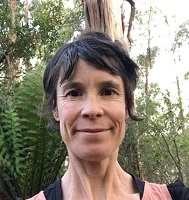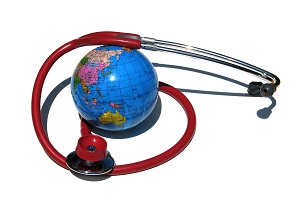The Lancet Countdown
The 2015 Lancet Commission’s conclusion that ‘tackling climate change could be the greatest global health opportunity of the 21st century’ highlighted the need for a global monitoring system with the ability to engage policymakers and support health professionals.
In 2016 the Lancet Countdown: Tracking Progress on Health and Climate Change was formed to address this gap, beginning with a public consultation to identify key areas of health and climate change to track and monitor. The collaboration recognises that the voice of the health profession is essential in driving forward progress on climate change and realising the health benefits of a robust response.
Publishing annually in The Lancet, with strategic and financial support from the Wellcome Trust, The Lancet Countdown is hosted by University College London, and works with 35 partners around the world to track and understand the link between climate change and health.
The Medical Journal of Australia (MJA) has partnered with the Lancet Countdown for the past two year to produce an Australia-specific ‘Countdown assessment’ assessed across five broad domains:
- climate change impacts, exposures and vulnerability
- adaptation, planning and resilience for health
- mitigation actions and health co‐benefits
- economics and finance
- public and political engagement.
Read the 2019 report of the MJA–Lancet Countdown on health and climate change: A turbulent year with mixed progress.
A message from RACGP Specific Interests Environmental Impacts in General Practice Chair, Dr Jessica Kneebone

My interest in climate change and protecting nature has been simmering away for several decades.
My first self-chosen school project in 1988 in upper primary school, I elected to research the ‘greenhouse effect’. I remember drawing many arrows bouncing around in the atmosphere, reflecting back to a hot looking earth. Back then, my project focused on the environmental impacts of the ‘greenhouse effect’.
I now know a lot more about the health impacts of climate change. The evidence that climate change is damaging our health is irrefutable. The World Health Organization (WHO) has stated that ‘climate change is the greatest threat to global health in the 21st century’. We are intrinsically linked to the ecosystems around us, and as they suffer, so too does our health.
As GPs, we see these health effects first hand. In January this year, 3% of my home state of Tasmania burned due to an extraordinary number of fires started by thousands of dry lightning strikes. Hobart was shrouded in thick smoke for weeks. In my practice, I saw patients with worsening respiratory symptoms who were unable to go to work or be outdoors. The mental health impacts of the bushfires continue to resonate around my community. As I write these words, bushfires are currently raging across three states in Australia and my thoughts go out to those affected by these fires.
As doctors, we can play a serious role in addressing climate change. Understanding the links between climate change and health is one of the most powerful motivators to inspiring action. We can educate ourselves, our colleagues and our patients about the impacts of climate change on health. There is strong evidence to show that actions to address climate change would provide significant benefits to health. For example, promoting active transport would improve cardiovascular fitness, reduce obesity, improve mental health, improve air quality and have many other flow on health benefits.
RACGP Specific Interests Environmental Impacts in General Practice, provides an opportunity for members to be involved in activities that promote the understanding of the impacts of climate change on health and encourage debate and discussion on the health issues arising from climate change.
Our objectives and responsibilities are to:
- promote a forum and network among RACGP members interested in climate change and other environmental, both built and natural, impacts on health to encourage and facilitate professional development and collaboration
- advocate education and awareness on the impact of environmental policy on health to medical students, general practice trainees and general practitioners in Australia
- establish links to support and promote the increased understanding of the adverse and beneficial impacts the environment and environmental policies have on health
- act as a resource point for the RACGP on environmental and climate change issues as they impact on general practice in Australia.
I hope you will be inspired by the resources below to take up action and join together to work on promoting good health in the face of climate change.
About me: I completed my MBBS (Hons) at the University of Melbourne 2001. I then moved to the Northern Territory where I completed the majority of my GP training in Aboriginal health settings. While undertaking my GP training, I completed a RANZCOG diploma (DRANZCOG) and a Master of Public Health (MPH). I was awarded my RACGP Fellowship in 2007. Eight years ago, I moved with my partner and two young children from Alice Springs to Hobart, seeking cooler weather. I currently work in an Aboriginal Health Service in Hobart and a primary care clinic for newly arrived refugees. When I’m not working in clinical practice, I enjoy spending time in nature and volunteering with various groups including the orange-bellied parrot captive breeding program.
Environmental Impact in General Practice on shareGP
RACGP Specific Interests Environmental Impacts in General Practice has a shareGP space.
This is an area for RACGP members with an interest in this area to share articles and research, discuss clinical practice and collaborate on projects.
When you visit the space, please ‘follow’ to keep updated on posts and other activities.
Climate change and health resources

Doctors for the Environment Australia
Doctors for the Environment Australia (DEA) has developed this fact sheet to outline the effects of climate change on human health particularly in Australia, and how health can benefit from efforts to lessen and prevent climate change.
DEA was formed in 2001, its membership includes GPs, surgeons, physicians, anaesthetists, psychiatrists, paediatricians, public health specialists, academics, medical students and researchers who are committed to providing scientific evidence to demonstrate the important health benefits of clean air and water, biodiverse natural places, stable climates and sustainable health care systems.
Canadian Association of Physicians for the Environment
The Canadian Association of Physicians for the Environment (CAPE) has produced a Climate Change Toolkit for Health Professionals. It is designed as a tool for health professionals and students in the healthcare and public health sectors who want to engage more directly on the issue of climate change.
Although written for a Canadian audience the toolkit is extensively referenced and translatable to Australian general practice. It consists of eight modules:
- Climate change – Science, drivers and global response
- Global health impacts of climate change
- Climate change health impacts across Canada
- Greenhouse gas emissions in Canada by sector
- Climate change solutions with immediate health benefits
- Taking action on climate change at health care facilities
- Preparing for climate change in our communities
- Engaging in climate change as health professionals
The New England Journal of Medicine
Climate crisis and health is a collection of articles and other resources brought together by the New England Journal of Medicine (NEJM) describing effects of climate change on physical and psychological health and on the function of healthcare systems. It including resources to support action by physicians and other health care professionals.